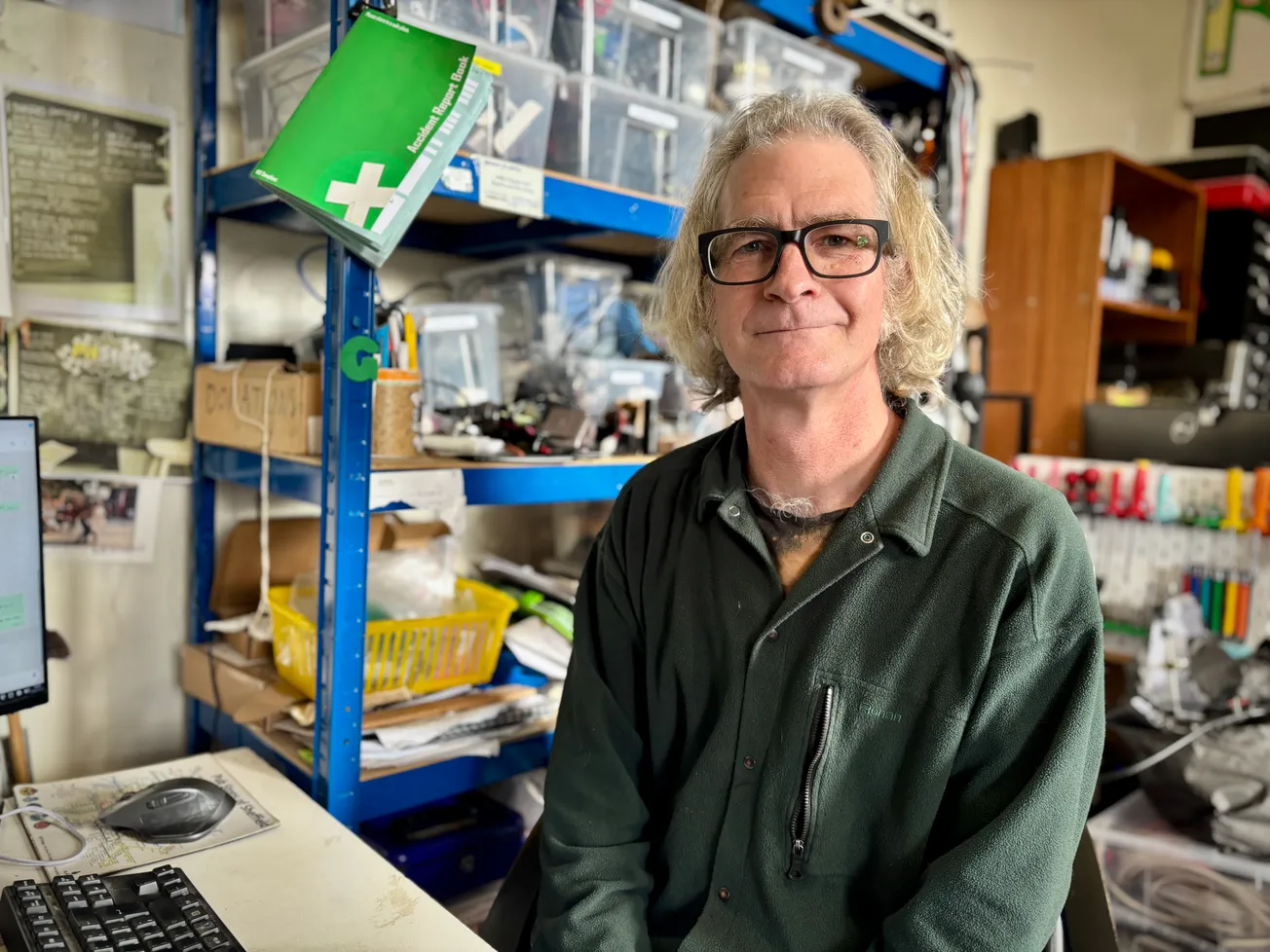The excitement is palpable. I’m at Reyt Repair, a volunteer-run repair shop in Pitsmoor, and the staff are getting ready to welcome their 2,400th repair. What will it be? An antique clock, a sleek electronic device, or even something new and exciting like a 3D printer? Sadly, no. When the next item arrives, it’s an old chair which has lost one of its arms.
But the armless chair is given the same treatment as anything else that comes in. It gets a numbered sticker, and the customer gets a promise they will do their best to fix it. “Quite wide, isn’t it?” says Reyt Repair manager Gareth Coleman. “Good for someone with a big bum.” The woman readily concurs. “Yes, I always give it to my sister when she comes round.”
As I’d arrived an hour earlier, I was first introduced to volunteer Tank. “Tank?” I ask. “Well, it’s John really, but everyone calls me Tank,” he explains. As you may well have guessed, Tank is a big guy. Not particularly tall but very wide. A grey hoodie adorns his oversized top half while black multi-pocketed work trousers cover up his relatively spindly legs. A shaved head and bushy goatee beard completes his imposing look.

Tank (real name John Crook), lives in Parson Cross, and volunteers at Reyt four times a week. His stock in trade is woodwork and mechanical repairs, but he will try his hand at pretty much anything, given the chance. Before volunteering here he was unemployed. Signposted by the Job Centre to Voluntary Action Sheffield on Rockingham Street in town, they told him about Reyt Repair. He’s been coming ever since.
Tank used to work at holiday park firm Pontins as a grounds manager, but when he lost his job there, he feared he was going to end up on the scrapheap. “Who wants to employ a 62 year old when I’m going to retire in five years?” he asks. However, coming here has given him a new lease of life, allowing him to use the skills he has learned to help others, and himself. “My dad always repaired his own stuff and I learned off him,” he says. “I just like to keep myself busy.”
Based at Abbeyfield House, a sprawling 18th century manor house overlooking Abbeyfield Park in Pitsmoor, Reyt Repair is one of only two full-time repair social enterprises in the UK. As I look around their workshop, every bit of wall and table is crammed with equipment: an array of power tools are hung from shelves on the back wall; plastic storage boxes full of electrical wire and devices threaten to burst apart; over my head, shelves groan with kettles and coffee machines; under a table in front of me hides a guitar amp and half a dozen sewing machines. “Go through your wardrobe,” reads a vintage-style poster on one wall. “Make do and mend.”

Today, as well as Tank and Gareth, there’s Mauro Yoshimoto, a retired 65-year-old electrical engineer originally from Brazil but who now lives in Mosborough, and Vincent Buensuceso, a 19-year-old second year robotics undergraduate at the University of Sheffield. Mauro is busy fiddling with an Italian cuckoo clock whose mechanism had stopped working, but now — judging by the tweets and twirps coming from it — is in full working order again. “I’m going to start wishing you hadn't fixed that," says one of his fellow repairers.
On the other side of the desk, Vincent is scratching his head over a ginormous Morphy Richards power steam iron which he thinks might have a scale problem. Tank helps him fill it with 10% vinegar in the hope of flushing the scale out, but it doesn’t seem to work. “Repair is a process of elimination,” says Tank, supportively.
Gareth Coleman, 53, is the person responsible for corralling this diverse crew into a team of master repairers. Dressed in a green fleece, blue jeans and thick-rimmed black glasses, his long grey hair gives him the slight air of a mad professor. With half of the repairs they do being charged their basic rate of £10 (more complex jobs are charged more), much of this stuff isn't economically viable to repair, he admits, but that’s missing the point. Gareth says some of the most hideous items people have ever been brought in have actually had the most sentimental value. “It could be something Aunty Gladys bought in Torremolinos. Especially if Gladys is no longer with us, that becomes something that there is a value to repairing,” he says. “It’s worth something to someone.”

But the economic value of what they do shouldn’t be dismissed out of hand, he adds. “Sometimes you can tell someone hasn't got much money and saving them 50 quid on a hoover repair is a big deal,”he says. “Other people bring in golf carts, which is a slightly different market.”
The first customer through the door clutches a yellow bag for life containing a Ninja multi-cooker (a combination air fryer, slow cooker and pressure cooker). Reyt has had a number of Ninja appliances recently. Gareth says he “has his suspicions” that the company might be guilty of making items with a built in shelf life, to encourage customers to buy the latest models. “Is it showing an error message?” he asks. The customer shakes his head solemnly. “So it doesn't even know it’s broken.” He sounds genuinely sorry for it.
If you enjoyed reading this story, please consider joining us as a paid member of The Tribune. It’s so rare that journalists these days get time to speak to normal people and have an honest conversation about their lives, and at a time when so much local news coverage concerns itself with crime and violence, we wanted to shine a light on a genuine positive news story. With our introductory offer, you can become a paid member for just £4.95 a month for your first three months – that’s £1.23 a week.
After the excitement of the 2,400th repair has died down, I take a walk into Abbeyfield Park with Gareth to chat about the philosophy behind Reyt Repair. Gareth studied experimental psychology at the University of Oxford and then worked in mental health and occupational therapy in the NHS, but found he “chafed” against organisations with big bureaucracies. He says doing what he is doing now is the perfect fit for him, but running a social enterprise certainly isn’t easy. At the moment he takes no wage out of Reyt, making ends meet by being frugal and being supported by his partner. The challenge could be made easier if they were able to secure regular funding from organisations like the National Lottery, or else by a policy change to favour repair including tax rebates or even a universal basic income (UBI).

No matter how idealistic he might want to be, he accepts that what they are doing goes against all economic realities. “There is a reason why repair shops have disappeared from the high street, it’s not an economically viable activity any more,” he says. “But we also want to do work that is different from Amazon or Boohoo or any of those types of companies, we want to give people meaningful activity that’s not trying to fix six vacuum cleaners in a day. Repairing is a slow business. Volunteers are here to have an enjoyable time.”
The other problem they come up against is that, as with the Ninja air fryer, an increasing amount of their time is spent trying to repair things that are designed not to be. This idea, sometimes called “planned obsolescence”, means that many of the items people bring in are made so you can’t actually get into them (as well as Ninjas, he lists Shark vacuums, and Dyson and Apple products). “Lots of these things are designed to be unrepairable or not designed with repair in mind,” he says. “That makes things slow and parts difficult to get hold of.”
But things are slowly changing. “Right to repair” is a consumer movement which wants manufacturers to be required to provide access to manuals, parts, and diagnostic tools. It’s backed in the UK by organisations like Restart, who are urging policy makers to sign their UK Repair and Reuse Declaration, calling on the UK government to make it easier for people to repair products and pass them on to others for a second life. “Repair is in the air,” Gareth tells me.

Repair's benefits are threefold, he argues. The environmental impact of using items for longer, the financial impact for customers of not having to purchase something new, and the social impact of doing good for the volunteers. For Gareth, repair is a win, win, win.
Back inside, a new repairer has arrived. Debz Robinson, 49, who lives in nearby Page Hall, comes twice a week and mends anything that needs sewing, mostly clothes but also bags and even tents. Dressed in purple flares, a hoodie with a print of outer space on it and an iridescent coat which is either purple or turquoise depending on which way you look at it, Debz is comfortably the most fashionable member of Reyt Repair. She puts her talent for mending clothes down to her mother. “We were a really short family,” she says. “My mum was always having to take up everyone's trousers, so she taught me how to do it as well.”
But since she has been coming to Reyt, Debz has broadened her skillset to include repairing the stained glass on Tiffany lamps, and she has also recently completed a course in kintsugi, the Japanese art of repairing pottery with lacquer mixed with powdered gold, silver, or platinum, a technique that literally translates to "golden joinery". Kintsugi is itself based on wabi-sabi, another Japanese idea which embraces imperfections, seeing the repair itself as part of the object's history rather than something to be hidden.

Despite Debz's presence, Reyt Repair is a typical “men’s shed”; spaces where men come together to share practical interests, skills, and friendship. “It’s good for meeting people and helps keep your mind active,” says Tank. “I’ve no missus so if I couldn't volunteer I'd just be stuck at home.” As well as doing his own repairs, Tank tells me he enjoys teaching others, and says feeling useful is really valuable for his mental health.
Just as I’m about to leave, a woman comes in with a laptop on which the keyboard has suddenly stopped working, Reyt's 2,403rd repair. Gareth suggests that the fault sounds more like a software problem and passes it to one of his team to take a look at. As she’s waiting for her repair receipt, I ask her what she thinks of Reyt. “I think they are amazing,” she says. "There’s nothing they can't fix.” Trying not to blush, Tank agrees. “The majority of stuff we do get fixed,” he says. “There’s not much that leaves us stumped.”
To find out more about Reyt Repair, visit their website.
If someone forwarded you this newsletter, click here to sign up to get quality local journalism in your inbox.
Thanks for reading this edition of The Tribune. Writing about people and their experiences is a core part of our approach, and we hope that you agree that it’s an important part of the service readers really need in an era of information super-abundance: shining a light on communities that aren’t often covered by local media. If you enjoyed this story and would like to receive more in your inbox, just sign up as a paying member by clicking the button below. With our introductory offer, it’s just £4.95 a month for your first three months – that’s just £1.23 a week.
If you’d like to sponsor editions of The Tribune and reach over 30,000 readers, you can get in touch or visit our advertising page below for more information







